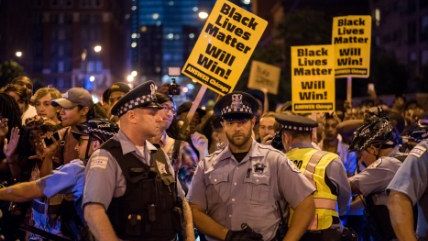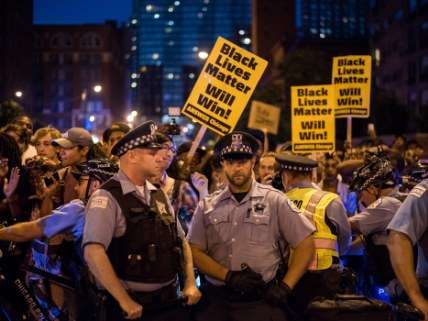Does the Theory of 'Broken Windows Policing' Apply When Police Are the Ones Breaking Windows?
The police's culture of silence and lack of accountability feeds Chicago's crime problems.


If Americans were asked to name top cities with major violent crime problems, a good chunk of them would most certainly point to Chicago. The city has been having one of its most violent years in a while, logging more homicides than New York City and Los Angeles combined this year.
If Americans were asked to name top cities with corrupt police departments that contribute to crime problems, once again, a good chunk of they would most certainly point to Chicago. The city's police department has a reputation for corruption and abuse that at this point may well be indelible. Just in the past couple of years we've had revealed Homan Square, a secret police facility where citizens were being held for interrogations without access to lawyers. We've discovered that Guantanamo turned to a Chicago Police detective to help develop the brutal interrogation techniques used on its prisoners. And a police officer was finally charged with first-degree murder for the shooting death of Laquan McDonald, after a judge ordered a resistant city to release dashcam footage proving the victim was shot while moving away from the officers, not toward them.
Those who would defend the aggressive behavior by police officers and very strict enforcement of even minor laws point to the theory of "Broken Windows Policing." The idea is that by not letting low-level disorderly behavior (vandalism, loitering, et cetera) slide, police reinforce an environment where bigger crimes are less likely to take hold.
The side effect of this policing method, though, has frequently been harassment of poor people and minorities for anything police can pin on them—such as having an unauthorized milk crate.
But let's just say that the theory is correct, just as an intellectual exercise. I'm not necessarily saying it should be supported, particularly since it creates an environment where citizens are mandated to live in a fashion that suits the state's desire for order and completely subverts the idea that government is supposed to be working for the citizens. But if the theory is correct, what can we assume from a city like Chicago that struggles not just with violent crime, but with violent police as well?
This week The Intercept has run a four-part series about two Chicago Police officers' horrifying (and mostly unsuccessful) attempt to fight corruption and expose a sergeant, Ronald Watts, who is accused of running a drug and protection racket from within the department (and there are rumors he was involved in the murders of two drug dealers). The two officers have sued the department as whistleblowers over what they claim to be essentially career-ending retaliation for attempting to expose wrongdoing both internally and to the FBI.
The lengthy narrative was put together by journalist Jamie Kalven of the Invisible Institute, which documents human rights abuses by police in Chicago. Kalven was also responsible for a lawsuit from 2014 where courts ruled that Chicago Police misconduct files must be made public.
The story series is important, and I encourage everybody to read it. The details will, unfortunately, probably not surprise many people who pay any attention to the culture that leads to police abuse cover ups. As Kalven notes in one chapter, part of the resistance to the officers exposing Watts was fear about what else might come out. The whole problem of a systematic "code of silence" is that a single breach in the dam ends up in a complete blow out:
The hostility from the bosses, [Chief of Internal Affairs Juan] Rivera explained, "isn't about Watts. They're worried you're going to tumble their houses of cards." Because the bosses don't know what you know, he went on, they're worried that you're investigating them.
Their situation, as described by Rivera, was Kafkaesque. They had been outed as working undercover on an internal affairs investigation, but no one knew whether that was the only investigation they were engaged in. So it was all too easy for the bosses to worry that they too were targets.
The story revolves around a lot of "He said, she said" accusations where the nature of the investigation put the officers in situations where it's difficult to prove that conversations even happened. But ultimately Watts and an associate were eventually convicted, and Watts was sentenced to 22 months in prison for stealing drug money from a courier who was actually an FBI informant. So these two police officers obviously aren't just making things up for attention.
The judge who ultimately sentenced Watts made comments at the time that ultimately brings the whole situation back to Broken Windows Policing. If the police see themselves as above the law and immune to culpability for criminal behavior, then they are reinforcing an environment of lawlessness:
[Judge Sharon Johnson] Coleman characterized Watts's crimes as "unconscionable" and "a betrayal." She seized on the government's description of the Wells development as a community "plagued" with crime, drug dealing, and gang activity: "The place was rampant with poverty, unemployment, addictions. The crime stuff comes after. … You were there to protect those people, and you didn't."
She also spoke of the impact corrupt officers such as Watts have on children in the community. "They're taught not to respect anything," she said. "What else are they supposed to think?"
Read Kalven's reporting here.

Show Comments (27)